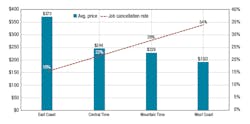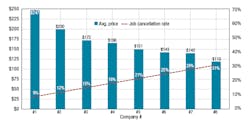Reducing Your Job Cancellation Rate
By Adi Azaria
With over 480,500 plumbers working across America, sometimes it’s important to take a step back and understand larger trends occurring in the field. Workiz field service management software recently released a study on the connection between job price and job cancellation rate for plumbers within the United States. Their results were surprising…
Best of all is besides research and insights, they’ve included practical suggestions on how to improve your business’s cancellation rate which you can start implementing immediately.
For this research study, Workiz analyzed 500,000 plumbing jobs performed by 2,000 Workiz user profiles over the past six months.
Now, here’s what they found….
East Coast vs. West Coast
Workiz found that the average price of jobs are highest on the East Coast ($373), while cancellation rates are at the lowest (15%.)
Meanwhile, on the West Coast, the average price per job is lowest, yet the cancellation rate is highest (average price per job is $193, with a 34% cancellation rate.)
Compare that to Central and Mountain states, where the average price of jobs and cancellation rates are both in the mid-range.
Which State Lets You Charge the Most?
While there are some obvious exceptions in their results, these patterns are also seen when looking across state lines.
East Coast states generally command the highest price per job, and have the lowest cancellation rates, with Central and Mountain commanding mid-range pricing per job and cancellation rates, while West Coast states have the lowest prices per job, yet the highest cancellation rates overall. Obviously, certain states don’t perfectly follow this trend, but overall the pattern is pretty clear.
Check Your Competitor
The patterns seem pretty set in stone when comparing info between time zones, states and even cities.
Even within the same city, prices and cancellation rates vary greatly between companies. Take Miami, Florida, for example. Within Miami, plumbers charge anywhere between $119-$247 for an average job. The lower the cancellation rate, the higher the average job price and vice versa. A company charging an average price of $247 per job has a 9% cancellation rate, a company charging an average price of $166 per job has an 18% cancellation rate, and a company charging an average price of $119 per job has a 31% cancellation rate.
Are Cancellation Rates Really Set in Stone?
The fact that we see the same behavior at every level (time zone, state, city, company, etc.) shows that there’s a firm correlation between average job price and cancellation rate.
Moreover, the variation in cancellation rates between competing companies (within the same city) tells us that these rates aren’t set in stone - and can actually be improved. Plumbers can successfully take steps to reduce their cancellation rates and positively impact their businesses.
By reducing your cancellation rate, you’ll be able to successfully charge more per job and increase your revenue. You’ll also be able to reduce your overall business overhead, (i.e. costs of administration, employee time, gas expenditure, missed jobs, etc.)
So How Do You Lower Your Cancellation Rate?
You can only improve what you can measure. Do you know what your cancellation rate actually is? The first step is measuring and quantifying it. Now, why are customers cancelling? Are there any patterns that you can see?
Field service management software is a great way to both gather and visualize raw customer data. For around $50-$100 a month you can easily measure your cancellation rate and see clear patterns in your business. Here are a few ways to cut down on cancellations right away:
No Used Car Salesman-Type Ads (No Offense)
If your advertising is confusing, misleading or subject to customer misinterpretation, you’re going to have problems (read: cancellations). It’s important to back up all of your advertisement and make sure you stand by what you say.
A Well-trained Dispatch is Worth its Weight in Gold
If your plumbing business uses a dispatcher, it’s important to make sure that they’re trained to clearly understand customer issues, and understand the job that the customer actually needs. Bringing the wrong part or sending a technician with the wrong skill set is likely to annoy your customer and end up in a cancelled job. Sure, it happens to the best of us - but it’s avoidable.
Call Them Back ASAP
One of the main pain-points that customers report is a lack of communication. When you send a plumber to a job, have them call the customer as soon as they are on their way, to provide reassurance that help is coming. This eliminates customers from guessing about whether or not someone is actually coming to fix their issue - even if they just spoke to dispatch.
Don’t Let it Go to Voicemail
Sure, voicemails are super annoying. But an unheard voicemail is the equivalent to leaving money on the table.
There’s some great technology which can transcribe your voicemail into a text message, which you can then convert into a job in a click. So once a customer leaves you a voicemail, you can make sure you’re on top of it.
Send Them Reminders
Hey. We all have a lot going on. Customers are forgetful, just like the rest of us. If a customer has a scheduled appointment, send them an automatic reminder before their appointment via text message. This will reduce the chance that they’ll somehow forget about their appointment, costing you time, money and aggravation.
Running Late? Let Them Know
Running late to a job? It happens. But your customer does need to know about it. Be sure to communicate all delays to your customers with a quick text message or call, so your customer stays in the loop and doesn’t feel forgotten about. (You can easily automate this with a field service software, like Workiz.)
Skills, Baby, Skills
Sending the wrong technician or part often times will wind up costing you the job. Make sure to get it right the first time by sending a technician with the relevant skill set to the job. The same goes for parts. Make sure you understand what parts are needed before sending a tech out. Inventory management is a great way to understand all of your available parts and where they’re located, so you have the full picture, and can make quick, informed decisions.
Appearances Matter
We’d all like to think that customers judge us on things like skill. Well - that’s only partially true. When customers go on Yelp, they’ll often review you on how professional we looked and acted. Appearance matters. Especially if you’re coming to a customer’s home it’s important to look legitimate and demonstrate trust by wearing a uniform, name tag and coming in a marked car, with your business logo. All of this goes to create customer confidence and reduce cancellations.
Show Your Customers You’re a Pro
Appearing professional really is a big part of the game. When you come to a job armed with a tablet or cell phone with digital invoices that customers can actually review and sign, it certainly beats the good old days of paper invoices with spilled coffee stains. Things like this really do matter to your customers, and it’s important to match the quality of service that they’re expecting.
It’s Not Your Customer - It’s Your Technician
Sometimes too many cancelled jobs, especially from a certain technician - can be an indicator of employee theft. But how do you know if your technician is actually committing service theft? The beauty of field service software is that it allows you to record and listen to employee calls, analyze their performance (understand their amounts of cancelled jobs over the long term), and track their location with GPS. Information like this lets you move from a “trust” based business to one that’s based on facts and objective information.
What do you think of the Workiz research study? Are there any strategies that you’re interested in using to minimize your cancellation rate and increase your job price? We’d love to hear your thoughts!
Adi Azaria is the CEO of Workiz, a San Diego-based field service management software company, that enables small businesses to easily manage every aspect of their operation and outperform larger competitors without the need for huge budgets or specialized expertise. He is also the co-founder of Sisense, the leading Business Intelligence solution, as well as a startup mentor at The Lisbon Challenge and the Junction (by Genesis Partners.)




